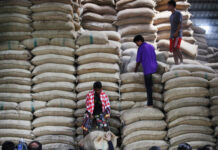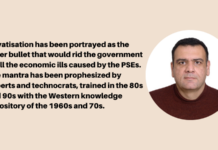While the country’s exports are showing a record decline due to the slash in textile exports, the Ministry of Textile Industry remains headless for the past two years. Although the government has announced a bailout package of Rs180 billion to save the sector from downfall, which accounts for 55 per cent of the total exports of the country, the entire ministry is being run on an ad-hoc basis, limiting it to only routine matters.
The ministry is being run without a minister since March 2015, when Senator Abbas Khan Afridi had left after the completion of his tenure. In the absence of the federal minister, Prime Minister Nawaz Sharif is the Minister-In-Charge of the ministry of textile industry, giving little attention to the ministry, apparently due to his engagements in other affairs.
Talking to Pakistan Today, Mohsin Aziz, chairman of the Senate Standing Committee on Textiles, said that the absence of a full-time minister of textile ministry for two years is very unfortunate, despite the grave situation of the industry. “This indicates the seriousness of the present government towards saving the sector, which is the only major contributor in exports. In the absence of the minister, all voices and complaints recorded through letters and media statements are unheard by the ministry,” he said. “Although the Minister of Commerce, Khurram Dastgir, tries to address issues related to textile, but he too, cannot play the role of the concerned minister due to his own busy engagements,” the senator added.
He alleged that the present government was knowingly destroying the sector where many industries have so far been closed, while the rest are running at 20 to 30 per cent. Owing to the prevailing situation, 21 per cent cotton crop has been shifted to sugar and other crops in southern Punjab. The cultivation of sugarcane has replaced cotton crop in southern Punjab, a province once known for its cotton production, which is now being imported from overseas. “According to our estimates, one million bales of cotton meant a loss of $ 1 billion. The step mother treatment to the textile sector will leave a far reaching negative effect on the major source of exports,” Mohsin Aziz said.
In reply to a query, he said the bailout package announced by the government for the textile sector is actually “Wada-e-Farda” (tomorrow’s promise) which is unlikely to make any major difference in textile exports. The package carries many conditions unlikely to be fulfilled by the crisis-stricken exporters and people related to the industry.
“I have written a number of letters to the prime minister, requesting him to take immediate steps to save the crippling industry, but all in vain,” he said adding the senate standing committee on textile will once again take up the issue.
Senator Mohsin Aziz has said that the unfavourable government policies and the high costs of doing business were also hampering the export volume of textile products. The textile industry is not shutting due to inefficiency, quality issue, raw material, and law and order, rather, the high cost of input coupled with the highest tariff of electricity and gas, as compared to competing countries like India, Bangladesh, Vietnam, China, etc, is the reason.
Mohsin Aziz said that instead of increasing textile exports after granting GSP+ status, which will grant duty-free access to Pakistan’s products to European Union market, the exports of textile products, had declined to the lowest level, even below the level of 2010-11.
It is pertinent to recall the Textile Policy (2014-19), which envisaged increasing textile exports to $26 billion in five years, however, the implementation of the policy hangs in the balance and little work has been done so far in this regard, as the concerned minister remains absent. The concerns of the industry about the pending sales tax refunds, withdrawal of various surcharges on electricity, for instance, the tariff rationalisation surcharge, gas and power availability at competitive prices with other regional countries, withdrawal of Gas Infrastructure Development Cess (GIDC), and restoring zero rated facility, are still pending.
























